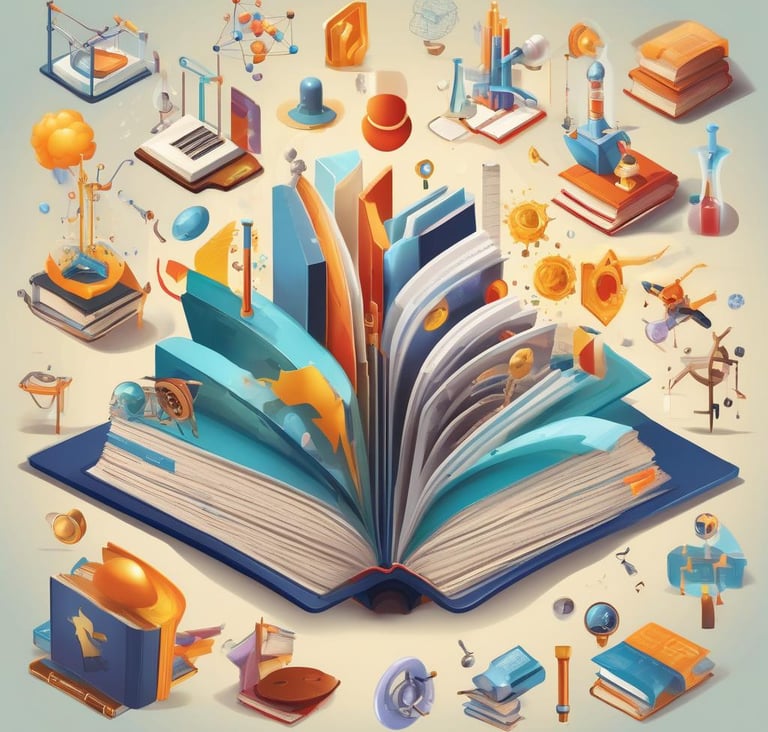
ABOUT BOOKS
Types and Benefits of Books, Audiobooks, and Reading Habits
Find different types of books, audiobooks and their benefits of reading or listening, and habits. Explore the differences between printed and digital books.
Let's explore the benefits of books, including their impact on mental health, inspiration, creativity, language skills, stress reduction, and the development of good habits. What are the types of books and their formats, such as printed and digital or audio, and how do they facilitate reading or listening? How do we benefit from them?




I. Benefits of Books
Books teach us new things, provide peace of mind, broaden our perspectives, and enhance our lifestyle. Now, let's explore in detail how books affect our lives.
1. Improving mental health
The mind is like the body. Just as proper food and exercise are necessary for good health, good thoughts and peace are also essential. Books are like good food for our minds.
Changing thoughts clearly: Reading good books gives us control over our thoughts and clarity on what to do.
Reducing depression and loneliness: Reading a good book alone can connect us to new people, and engaging with good stories can increase our happiness.
Solving problems – When we face a situation in life and don't have the opportunity to ask someone first, we can find the right solution through books.
That is why reading good books is an excellent way to improve mental health.
2. Spreading opinions and inspiring creativity
Every person has their own opinion and way of thinking. However, when we read books, we gain the opportunity to understand the views of others and think from different perspectives.
Knowing different perspectives: Books offer various solutions and diverse opinions on the same problem.
Enhancing creativity: Reading books is not just a pastime; it's a source of inspiration for writing, creating art, and making discoveries. Books by other writers have inspired some of the greatest creative minds, and they can do the same for you, sparking new ideas, encouraging experimentation, and igniting your creative potential.
Encouraging new ideas: Reading a good book inspires new business ideas, ways of life, and experiments.
That is why reading books is a handy way to develop creative thinking.
3. Developing language skills
Books are vital for enhancing their speaking, writing, and vocabulary skills.
Increasing vocabulary: If you read good books, you will learn new words, their meanings, and usages.
Improving grammar: Reading books is an excellent way for children and students to enhance their grammar skills. It increases their understanding of sentence structure and grammar.
Developing writing skills: Good writers usually read daily. We also make a habit of writing well when we read good works.
No matter what language we learn, reading books is the only right way to speak it fluently.
4. Reducing stress and developing good habits
These days, many people suffer from stress and anxiety. Books give us mental peace in such situations.
Stories and novels ease the mind: when we read good storybooks, we become fully immersed in the story, which helps reduce our stress.
Knowing the experiences of others: When we face any difficulty in life, books show us the way. By learning from the experiences of others, we can make informed decisions.
Increases attention and patience: It takes patience to read a book thoroughly. The habit of reading often helps us do any work patiently and diligently.
Stay away from social media. Reading books engages our brains more effectively than spending excessive time on mobile devices and TVs.
Reading books is a great way to relieve stress and calm down. Books offer numerous benefits, including enhancing mental health, broadening our perspectives, improving language skills, and reducing stress.
If we devote 30 minutes daily to reading, we will experience numerous positive changes. If we see books as friends, they will help us throughout our lives.
What is your favourite book? Which of the books you have read has influenced you the most?
II. Types of Books
Books are of different types. Each one has its speciality. Reading some can increase our imagination, while others can be educational. Some products aim to enhance our personality. Now, let's take a closer look at the main types of books.
1. Literary books (stories, novels, poetry)
Literature is a magic that touches the mind. It affects our emotions and shows us new worlds.
Stories: Stories convey a powerful message through minor, everyday incidents. These include folk tales, fables, horror stories, love stories, and children's stories. Fables teach children good habits, and horror and mystery stories increase our imagination.
Novels: A novel is a long story that contains notes, events, characters, and emotions and is heartwarming. Some books, such as "Malgudi Days" and "Paatala Bhairavi," change our lives.
Literary novels help us understand our lives.
Poetry: Poetry reflects emotions. Some poems express love, sadness, and happiness. Poetry touches our hearts. It makes language sound more beautiful.
Literary books help us understand emotions and develop our imagination.
2. Educational books (textbooks, scientific books)
Books are essential tools for learning. Educational books hold significant value for students and anyone seeking to broaden their understanding.
Textbooks are valuable resources for students. Schools and colleges teach them, and textbooks are available for all subjects, including mathematics, physics, biology, languages, and more.
Scientific books: Scientists and researchers use unique books. Doctors have medical books, and engineers have technical books. These are useful for new inventions and research. Educational books provide us with worldly knowledge. They help us in our career development and progress.
3. Self-improvement books can enhance our personality, boost our self-confidence, and aid our success.
Benefits of self-improvement books:
Increase self-confidence: Teach us how to achieve goals.
Change habits and practices: Explain how to adopt good habits.
Earning and leadership skills: Essential for advancing in business and professional roles.
Popular self-improvement books:
"Atomic Habits" Explains how small habits can make a difference.
"The Power of Now" is a book that teaches us how to enjoy the present moment with happiness.
These books instil in us new self-confidence. They are excellent guides for those who want to make significant changes.
4. History, biographies, and philosophy books
These are valuable for understanding humanity's past, learning about the lives of great individuals, and exploring profound thoughts.
History books: Explain the events, wars, dynasties, and cultures that happened in the past. This approach can enhance our understanding of history and help us make better choices in the future.
Biographies: Explain the lives of great people like Mahatma Gandhi, Abraham Lincoln, and Swami Vivekananda. If we read these, the difficulties they faced and the successes they achieved will inspire us.
Philosophy books: Books that answer deep questions like "What is life?" and "Why are we here?" Many philosophical books are available, including the Bhagavad Gita, Buddhist texts, and the works of Plato and Aristotle.
These types of books offer us profound thoughts. They have the power to change our way of life!
Books come in various types: literary books enhance our imagination, educational books expand our knowledge, and self-improvement books foster personal growth. History, biographies, and philosophy inspire deep thoughts.
Reading books has become a significant force that changes our lives. What type of books do you like to read the most?
Stress has become one of the most significant problems today. It impacts mental health, thus affecting overall health. Reading or listening to books is beneficial to avoid mental health issues. Reading can be a form of self-care, a way to take a break from the stressors of daily life and focus on something enjoyable and fulfilling. Books have been a powerful tool and remedy. They allow individuals to escape from these issues.
Reading self-help literature is not just about gaining knowledge; it's about gaining control. These books offer practical methods to manage anxiety or stress and improve mindfulness. They empower you to take charge of your mental health and well-being, instilling a sense of control and empowerment.
Moreover, audiobooks offer the convenience of enjoying literature while multitasking, making it easier to integrate calming reading habits into busy schedules. This accessibility ensures that reading can be a part of your life, no matter how hectic.
By creating a routine that includes regular reading or listening to books, individuals can develop healthier habits, cultivate a more peaceful mindset, and improve their emotional well-being. Ultimately, turning pages—or pressing play—can lead to profound positive changes in one's life, instilling a sense of hope and optimism that change is possible.


III. Printed and digital books
Book reading has changed over time. In the past, people needed to read only books. However, with the advancement of technology, e-books and audiobooks have become an integral part of our lives. Still, no one can deny the uniqueness of printed books. On the one hand, traditional books and digital books. Let's find out the advantages of both.
1. Features of printed books
The feeling of holding a book and reading: There is a unique pleasure in holding printed books in your hands, turning the pages, and enjoying the aroma. It is a wonderful experience for book lovers.
Excellent connectivity: We are more connected with printed books. Compared to a screen, we can focus more when reading a book and are less likely to get distracted.
Useful for exams: Printed books are very beneficial for students. They allow them to mark essential points with a marker and write notes wherever necessary.
No harm to the eyes: Reading printed books puts less strain on the eyes. However, reading for an extended period while looking at a mobile or laptop screen can cause eye strain.
Durability: If properly maintained, printed books last for many years. They serve as a treasure that families can pass down through generations.
Valid for collection: Collecting printed books in libraries and on home shelves is a unique hobby. Some books become a distinctive mark in our lives.
Educational institutions rely heavily on printed books, which schools and colleges utilise effectively. They are the best tools for developing the habit of reading.
2. Importance of e-books and audiobooks
E-books and audiobooks are essential in the digital era. Along with printed books, they offer many benefits to reading enthusiasts.
E-books: E-books are books provided in digital format through the Internet. They have revolutionised human life.
Accessibility: E-books can be read anywhere, at any time. They are available on mobile devices, laptops, and tablets.
Environmental friendliness: E-books significantly influence ecological protection by reducing paper usage.
Low-cost availability: E-books are generally more affordable than print books, and some are free. If you find it difficult to read small letters, you can increase the font size.
Audiobooks: Audiobooks (Affiliate Link) are convenient for busy people.
Suppose you don't have time to read. In that case, you can listen to audiobooks while travelling, exercising, cooking, or doing household chores. Very good for the visually impaired. Audiobooks are a boon for those who cannot read while looking. You can enjoy a well-crafted narrative style – professional voice artists narrate some audiobooks. These create good interest.
Useful for language learning: These audiobooks are beneficial for learning new languages.
3. How is reading books changing in the digital age?
The digital age has significantly transformed how we read books. Today's generation increasingly turns to e-books, audiobooks, and e-readers like the Kindle.
Book lovers' tastes are changing: While some still prefer printed books, many opt for e-books and audiobooks for convenience. Even young children are now interested in listening to stories online.
The impact of social media: Choosing books based on reviews and ratings is becoming increasingly popular. Book discussions are expanding on social media, including book clubs, Goodreads, and Telegram groups.
Libraries are also embracing digital transformation. Some libraries offer digital books online, and students now use online resources more than paper books.
Printed books still offer the tactile experience of reading. However, new formats, such as e-books and audiobooks, offer convenience.
Which type of books do you like the most? Are you a fan of printed books? Or do you prefer the convenience of digital books?
IV. How do you develop a book-reading habit?
The habit of reading books is a great asset. It is a good way to expand our minds, sharpen our thoughts, and increase our knowledge. However, many people struggle with the problem of "I feel like reading, but I don't know what to read." Others may feel, "I don't have enough time" or "Once I start a book, it's difficult to finish it." However, if you follow the right approach, you can make reading a part of your life.
Now, let's examine key points, such as selecting suitable books, reading daily, and fostering interest in children and youth.
1. Choosing good books: It is easy to read, but selecting the right book is crucial. Choosing a book that suits our taste keeps our passion for reading alive. However, we should consider the following points before selecting a book.
What is your interest?
Some people enjoy stories and novels, while others prefer history and biographies. Science, technology, and self-help books are good choices for increasing knowledge. Those who want to improve their language skills can read poetry, plays, and essays.
Read book reviews: Before buying a book, read reviews directly. You can utilise Goodreads, Amazon, and Telegram book groups.
Start with small books: You may get bored in the middle if you choose a big book first. Reading short books of 100-150 pages gives you the joy of finishing one. If you increase the practice of reading like that, you can slowly read more oversized books, too.
Start with books by familiar authors: Reading books by authors you like seems much more straightforward. That said, reading an author for the first time is preferable to reading one with a familiar style.
2. How do you develop a habit of reading daily?
Developing the habit of reading doesn't happen overnight or in a week. You need to cultivate it gradually. By following some tips, you can establish this habit more quickly.
Start reading for 10-15 minutes daily: Read for at least 10 minutes without setting big goals. It will help you become accustomed to reading.
Set a time: Set aside a regular time, such as when you wake up or before bed at night. Reading in the morning when you're fresh will help you understand more, and reading before bed can improve your sleep.
Keep your book available: Carry a small book or Kindle/e-book wherever you go. Reading while travelling or waiting in line will save you time.
Join a book club or group: Joining a book club will make us more enthusiastic about reading. Book clubs are available on social media platforms, including Telegram, WhatsApp, and Facebook.
Even if it seems boring, don't change: You should stop reading some books in the middle, but continue the habit by choosing a fascinating new one. It is better to choose something you like rather than forcing yourself to read a book you don't enjoy.
3. Ways to increase interest in books in children and youth
In today's digital age, screens increasingly attract children and young people. But with a bit of attention and encouragement in the right ways, you can also increase the habit of reading books in them.
For children:
Give short story books: Storybooks with colourful pictures seem attractive to them.
Read stories to them: As long as children can read, make it a habit to tell them stories.
Give small gifts: If children read a book, consider giving them a small gift as an incentive to increase their enthusiasm.
It is wrong to give mobile phones instead of books! If they are not interested in reading, slowly direct them towards books instead of showing them mobile phones or TV.
For the youth:
Introduce books that suit their taste and suggest stories and novels they like first. Organise book clubs and discussions, including them in groups that discuss the books they have read. Promote self-help books and introduce books that benefit personal growth and development.
Reading is not just a habit but a powerful tool that improves our intelligence. It can change our thinking style, increase our knowledge, and improve our way of life.
Do you have the habit of reading? How much time do you allocate per day? What is your favourite book?